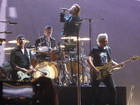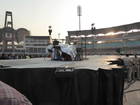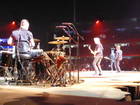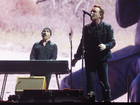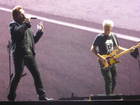U2 Elevation Tour
Elevation Tour 3rd leg: North America
: Oakland Arena - Oakland, California, USA
U2, Older But Wiser
Kim Johnson (published on 2001-11-16)Source: The Daily Californian
By KIM JOHNSON
Friday, November 16, 2001
You have to admire Gwen Stefani. She's such a capable frontman for No Doubt, gamely writhing in her trademark Skate-Rat Barbie wardrobe, playing the room as if it were a grungy little club, as if there weren't 15,000 pairs of eyes on her. As if they were there to watch No Doubt. Stefani and company, opening for U2 on the current leg of their American tour, play loud and fast and with a healthy measure of flippancy, tearing through tunes like "Just a Girl" with plenty of spunk. But, it must be said, when U2 hit the stage, intentionally or not, they're schooling the young-'uns.
During the first of two sold out shows at the Oakland Arena on Thursday night, U2 reasserted themselves as rock and roll contenders, and proved that, in their third decade, they remain a Band That Matters.
U2's performance on Thursday night opened with "Elevation," an engine of a song in studio that became hyperpowered under the Adam Clayton's pumping bass. Making full use of their stage set, singer Bono ranged around the massive heart-shaped walkways extending 100 feet out into the audience, moving with that odd, arrhythmical, ape-like lurch he's developed. (Twenty-four years in the business and still no rhythm?) His posturing began to fade with the start of "Beautiful Day," a truly transcendent piece from their current release All That You Can't Leave Behind, and that just opened up the floodgates of emotion.
Bono's great strength as U2's vanguard is the rapport he develops with an audience. Thursday night found him going beyond the handshakes and high-fives as he crowd-walked and then plucked a little girl of five or six from the fans to ride on his shoulders as he sang "New Year's Day" from 1985's War.
The set found the band reaching farther back into their catalogue, playing "Out of Control," which delighted the rapt crowd—who were, surprisingly, mostly middle-aged. Memo to the recording industry: your target demographic can't afford current concert tickets.
Though the band revisited songs from early recordings, the bulk of the performance was drawn from All That You Can't Leave Behind. Bono, in another moment erasing the line between performer and crowd, introduced "Kite" as a song he'd written for his son. Tearing up as he revealed that his father had recently passed away, the singer admitted that he considered the song to be a parting gift from father to son.
In what has come to be standard procedure during U2 shows, The Edge and Bono wandered out to the front of the stage extensions to perform a couple of songs acoustically, without the inexorable bashing of workhorse drummer Larry Mullen Jr. The Edge, who can somehow get more sound out of a guitar than seems possible, strummed "Wild Honey" into a manifesto of sorts, his delicate harmony filling in the high notes for Bono, who wryly disclosed that his habit is affecting his job: "You may have notice that there's something missing from the top of my voice," he joked. "It's a pack of Marlboro Lights."
As Mullen and Clayton rejoined their bandmates, the chiming opening to "Bad" jumpstarted the crowd into screams, but it was the following number that brought the house down. The elegant opening chords to "Where the Streets Have No Name" manage to sound solemn and radiant even after countless listens, and as Mullen's drums began to race and the lights came up on 30,000 upraised hands, it was, in a word, thrilling.
It wouldn't be a U2 concert without a dose of political commentary. The events of the last two months have provided plenty of material. Bono introduced "Please" as a song written against religious fundamentalists, who "remake God in their own image: small, pathetic." His gestures of patriotic solidarity drew cheers from the throng. Applause erupted when, in the middle of "Sunday Bloody Sunday," he substituted for his usual political rant a long silence during which he cradled an American flag offered up by an audience member. The band reworked lyrics of "New York" to acknowledge the tragedy. But the most stirring, and genuine, moment of the evening came with the second encore. Over the strains of "One," as Bono sang pointedly, "We're one, but we're not the same/ We've got to carry each other, carry each other," the names of the dead from Sept. 11 scrolled up a large screen and across the audience. "One" was absolutely transformed from a breakup song to an anthem of peace and unity, and despite the cavernous Arena and it's less than intimate sound system, the sentiment felt true.
Often plagiarised, never matched.
